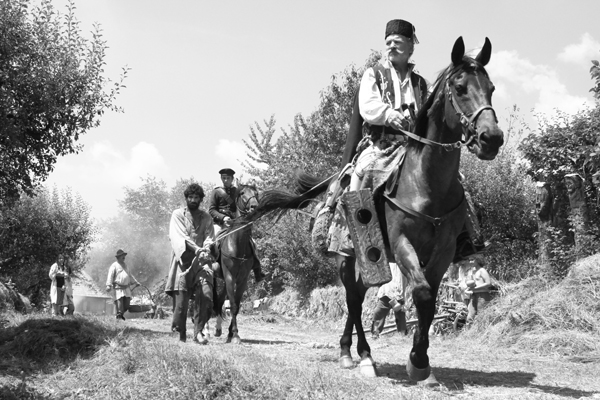The festival Making Waves: New Romanian Cinema, screening at the Film Society of Lincoln Center from December 2-8, is celebrating its 10th edition, and is using this milestone as an occasion to look back on the Romanian New Wave, which, of course by now, is not so new.
Besides its usual focus on recent films—which this year includes such acclaimed films as Corneliu Porumboiu’s The Treasure and Radu Jude’s Aferim!—the program will include special screenings of two key New Wave films: Cristi Puiu’s The Death of Mr. Lazarescu (2005) and Cristian Nemescu’s California Dreamin’ (Endless) (2007). The retrospective bent is also reflected in the tribute to Mircea Daneliuc, a filmmaker who began his career in the 1970s and whose works inspired many filmmakers of the early 2000’s new wave.
Daneliuc’s 1993 feature, Intimate Bed, will open this year’s festival, breaking with its usual practice of featuring a recent work. This caustic satire of life in post-Ceausescu Romania is a harshly anarchic portrait of an economically depressed and morally corrupt society that is just as piercing in its critiques as the films Daneliuc made before the 1989 revolution.
Vasile Potop, a movie theater manager, drowns in daily strife and a million stresses and annoyances. His relationship with his wife, Carolina, has curdled into a mutual disgust, which comes to a head when his wife tells him she’s pregnant, when they can barely afford the kids they currently have. Vasile’s only respite from his misery is in the furtive sex sessions he has with Stela, his cashier/accountant. He scrambles to gather money to pay for the abortion he demands of Carolina, as well as making Stela happy. The heightened despair in Intimate Bed is exaggerated to the point of comic farce as strained and economic desperation make some long for the less free but also less complicated days of the Ceausescu regime.
Radu Jude, whose penetrating and darkly humorous examinations of contemporary Romanian society (The Happiest Girl in the World and Everybody in Our Family) have marked his career as well worth watching, turns his incisive gaze to the past in his latest, Aferim! Built on a classic western template—American westerns and its Soviet-era Eastern European counterparts—Aferim! identifies the roots of current anti-Roma racism by detailing their status as slaves in the 19th century. The often stunning and incredibly detailed 35mm black-and-white photography teems with vivid portrayals of life in this period, depicted with much ribald humor, reinforced with reams of salty, profane dialog.
The film uses the archetypal western plot of a fugitive being captured and brought to punishment, by following Costandin (Teodor Corban), a constable hired by a landlord to return his gypsy slave Carfin (Cuzin Toma), whom the landlord accuses of seducing his wife and then escaping. The narrative takes the form of a road movie, during which the brutal societal hierarchies—with gypsies, Jews, and foreigners solidly at the bottom—are starkly apparent, expressed through verbal expressions of contempt and loathing. Jude demonstrates the same powers of observation that marked his previous films, but this time with an even more pointed and urgent political edge.
Radu Muntean, in such films as his justly acclaimed previous feature Tuesday, After Christmas, immerses the viewer in the minute details of the domestic lives of his characters and in the ways their moral dilemmas transform them. Muntean continues this sort of inquiry in his follow-up, One Floor Below, in which the protagonist faces an even graver quandary than the infidelity in Tuesday, After Christmas.
Sandu (Teodor Corban), a man who works as a car registration fixer, overhears a heated argument between a man and a woman as he passes the door of his downstairs neighbor. After lingering a bit to eavesdrop, he encounters Vali (Iulian Postelnicu), the young man in the argument, storming out of the apartment; they recognize each other but part in awkward silence. The next day, the woman is found murdered, and it seems all but certain that Vali was the culprit. However, when questioned by the police, Sandu doesn’t tell them what he overheard the day before. The rest of the film revolves around Sandu’s silence about this matter, and the eventual consequences to him and his family, especially as Vali begins to insinuate himself ever further into Sandu’s life.
Although the camera almost always keeps Sandu in view and goes into exhaustively detail into his daily life, his motivations and much about his character remain opaque. In this way, One Floor Below hews closely to many of the stylistic hallmarks adopted by many Romanian New Wave filmmakers: an unadorned, often minimalist style that prioritizes a sense of realism, much of the time with a potent sociopolitical perspective. Muntean takes this almost to an extreme, to the point that his film often feels like a perverse exercise in exploring how much drama he can drain from this situation and still have it retain any sort of audience interest. The problem with this approach is that there’s a thin line between an intriguingly minimal scenario and a frustratingly undernourished one, and Muntean unfortunately all too often winds up on the wrong side of that line.
Tudor Giurgiu’s Why Me? uses a real-life tragedy as the springboard for a labyrinthine political thriller that’s compared to the work of Sidney Lumet in the festival program, but it much more closely evokes American paranoid thrillers of the ’70s such as The Parallax View or The Conversation. Cristian (Emilian Oprea) is a young prosecutor groomed by his superiors for a fast-track promotion. He’s given the task of investigating another prosecutor suspected of corruption. Cristian seizes on the chance to advance himself, but as he comes under pressure to produce a swift conviction even though the evidence in the case is extremely shaky, he finds that he’s being used as a pawn in a much larger power game, one involving political forces well beyond his control. Cristian begins to suspect everyone around him of spying on him, especially after he’s taken off the case and relieved of his duties.
Why Me? starts off rather ponderously, with overly expository scenes that initially weigh the film down. It’s also rather visually unremarkable, often feeling more like a TV movie than cinema. However, its second half is much stronger, as the forces against Cristian converge upon him, with tragic results. The film eventually becomes an angry condemnation of an actual injustice, one that destroys many people’s lives.


















Leave A Comment